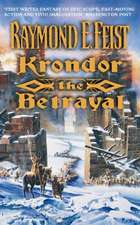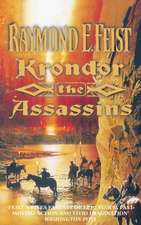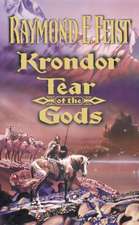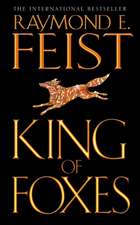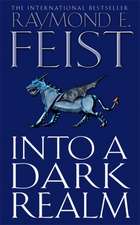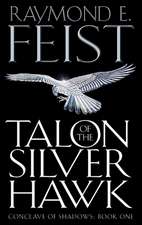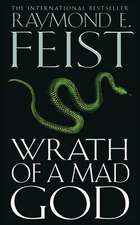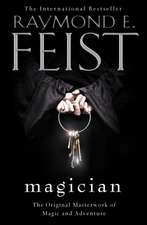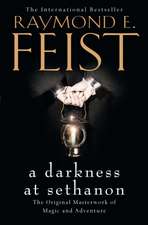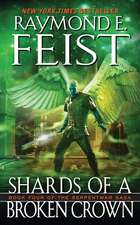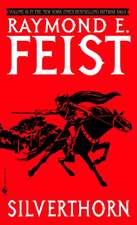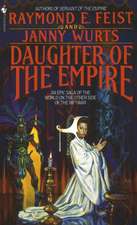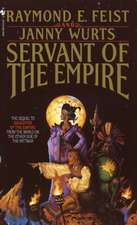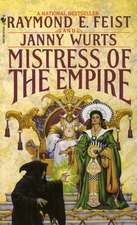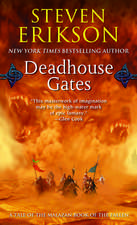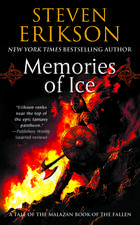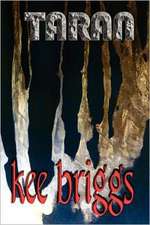Prince of the Blood
Autor Raymond E. Feisten Limba Engleză Paperback – 6 sep 2004
| Toate formatele și edițiile | Preț | Express |
|---|---|---|
| Paperback (2) | 62.92 lei 3-5 săpt. | |
| Spectra Books – 31 mai 2005 | 62.92 lei 3-5 săpt. | |
| HarperCollins Publishers – 6 sep 2004 | 69.81 lei 3-5 săpt. | +9.80 lei 5-11 zile |
Preț: 69.81 lei
Nou
Puncte Express: 105
Preț estimativ în valută:
13.36€ • 13.90$ • 11.03£
13.36€ • 13.90$ • 11.03£
Carte disponibilă
Livrare economică 24 martie-07 aprilie
Livrare express 08-14 martie pentru 19.79 lei
Preluare comenzi: 021 569.72.76
Specificații
ISBN-13: 9780007176168
ISBN-10: 0007176163
Pagini: 480
Dimensiuni: 111 x 179 x 34 mm
Greutate: 0.24 kg
Ediția:ePub edition
Editura: HarperCollins Publishers
Locul publicării:United Kingdom
ISBN-10: 0007176163
Pagini: 480
Dimensiuni: 111 x 179 x 34 mm
Greutate: 0.24 kg
Ediția:ePub edition
Editura: HarperCollins Publishers
Locul publicării:United Kingdom
Descriere
A newly revised edition of Raymond E. Feist' s continuation of his classic Riftwar series. Set twenty years after the events of the Riftwar, Prince of the Blood follows the adventures of Prince Arutha's sons in the dangerously unstable Great Empire of Kesh.
Notă biografică
Raymond E. Feist is the international bestselling author or co-author of twenty one novels, including Magician, Silverthorn, A Darkness at Sethanon, Faerie Tale, The Kings Buccaneer, Talon of the Silver Hawk, and King of Foxes. Feist is a graduate of the University of California, San Diego, and resides in Southern California with his family. He travels, collects wine, and lives and dies with the San Diego Chargers.
From the Hardcover edition.
From the Hardcover edition.
Extras
Chapter one
HOMECOMING
THE INN WAS QUIET.
Walls darkened with years of fireplace soot drank in the lanternlight, reflecting dim illumination. The dying fire in the hearth offered scant warmth and, from the demeanor of those who chose to sit before it, less cheer. In contrast to the mood of most establishments of its ilk, this inn was nearly somber. In murky corners, men spoke in hushed tones, discussing things best not overheard by the uninvolved. A grunt of agreement to a whispered proposal or a bitter laugh from a woman of negotiable virtue were the only sounds to intrude upon the silence. The majority of the denizens of the inn called the Sleeping Dockman were closely watching the game.
The game was pokiir, common to the Empire of Great Kesh to the south and now replacing lin-lan and pashawa as the gambler’s choice in the inns and taverns of the Western Realm of the Kingdom. One player held his five cards before him, his eyes narrowed in concentration. An off-duty soldier, he kept alert for any sign of trouble in the room, and trouble was rapidly approaching. He made a display of studying his cards, while discreetly inspecting the five men who played at the table with him.
The first two on his left were rough men. Both were sunburned, and the hands holding their cards were heavily callused; faded linen shirts and cotton trousers hung loosely on lank but muscular frames. Neither wore boots or even sandals, barefoot despite the cool night air—a certain sign they were sailors waiting for a new berth. Usually such men quickly lost their pay and were bound again for sea, but from the way they had bet all night, the soldier was certain they were working for the man who sat to his right.
That man sat patiently, waiting to see if the soldier would match his bet or fold his cards, forfeiting his chance to buy up to three new cards. The soldier had seen his sort many times before; a rich merchant’s son, or a younger son of a minor noble, with too much time on his hands and too little sense. He was fashionably attired in the latest rage among the young men of Krondor: a short pair of breeches tucked into hose, allowing the pant legs above the calf to balloon out. A simple white shirt was embroidered with pearls and semiprecious stones, and the jacket was the new cutaway design, a rather garish yellow, with white-and-silver brocade at the wrists and collar. He was a typical dandy. And from the look of the Rodezian slamanca hanging from the loose baldric across his shoulder, a dangerous man. It was a sword only used by a master or someone seeking a quick death—in the hands of an expert it was a fearsome weapon; in the hands of the inexperienced it was suicide.
The man had probably lost large sums of money before and now sought to recoup his previous losses by cheating at cards. One or the other of the sailors would win an occasional hand, but the soldier was certain this was planned to keep suspicion from falling upon the young dandy. The soldier sighed, as if troubled by what choice to make. The other two players waited patiently for him to make his play.
They were twin brothers, tall—two inches over six feet he judged—and fit in appearance. Both came to the table armed with rapiers, again the choice of experts or fools. Since Prince Arutha had come to the throne of Krondor twenty years before, rapiers had become the choice of men who wore weapons as a consideration of fashion rather than survival. But these two didn’t look the type to sport weapons as decorative baubles. They were dressed as common mercenaries, just in from caravan duty from the look of them. Dust still clung to their tunics and leather vests, while their red-brown hair was lightly matted. Both needed a shave. Yet while their clothing was common and dirty, there was nothing that looked neglected about their armor or arms; they might not pause to bathe after weeks on a caravan, but they would take an hour to oil their leather and polish their steel. They looked genuine in their part, save for a feeling of vague familiarity that caused the soldier slight discomfort: both spoke with none of the rough speech common to mercenaries, but rather with the educated crispness of those used to spending their days in court, not fighting bandits. And they were young, little more than boys.
The brothers had commenced the game with glee, ordering tan- kard after tankard of ale, letting losses delight them as much as wins, but now that the stakes of the game were rising, they had become somber. They glanced at each other from time to time, and the soldier was certain they shared silent communication the way twins often did.
The soldier shook his head. “Not me.” He threw down his cards, one of them flipping completely over for an instant before it came to rest upon the table. “I’ve got duty in an hour; I’d best be back to the barracks.”
What he really knew was that trouble was imminent, and if he were still around when it arrived, he’d never make muster. And the duty sergeant was a man not given to receiving excuses kindly.
Now the dandy’s eyes turned to the first of the two brothers. “Play?”
As the soldier reached the door of the inn, he took note of two men standing quietly in the corner. They stood in great cloaks, faces obscured slightly by the shadows of their hoods, despite the night being warm. Both made a show of quietly watching the game, but they were taking in every detail of the inn. They also looked familiar to the soldier, but he couldn’t place them. And there was something about the way they stood, as if ready to leap to action, that reaffirmed his determination to reach the city barracks early. He opened the door to the inn and stepped through, closing it behind.
The man closest to the door turned to his companion, his face only partially illuminated by the light from the lantern above. “You’d better get outside. It’s about to break loose.”
His companion nodded. In the twenty years they’d been friends, he had learned never to second-guess his companion’s ability to sense trouble in the city. He quickly stepped through the door after the soldier.
At the table, the betting reached the first of the two brothers. He made a face, as if perplexed by the play of the cards. The dandy said, “Are you staying or folding?”
“Well,” answered the young man, “this is something of a poser.” He looked at his brother. “Erland, I would have sworn an oath to Astalon the Judge that I saw a Blue Lady flip when that soldier tossed in his hand.”
“Why,” answered his twin with a twisted smile, “does that pose a problem, Borric?”
“Because I also have a Blue Lady in my hand.”
Men began to back away from the table as the tone of conversation shifted. Discussion of what cards one held was not the norm. “I still see no problem,” observed Erland, “as there are two Blue Ladies in the deck.”
With a malicious grin, Borric said, “But you see, our friend over here”—he indicated the dandy—“also has a Blue Lady tucked just not quite far enough back in his sleeve.”
Instantly the room erupted into motion as men put as much distance as possible between the combatants and themselves. Borric leaped from his seat, gripping the edge of the table and overturning it, forcing the dandy and his two henchmen back. Erland had his rapier and a long dirk out as the dandy drew his slamanca.
One of the two sailors lost his footing and fell forward. As he tried to rise, he found his chin met by the toe of Borric’s boot. He collapsed into a heap at the young mercenary’s feet. The dandy leaped forward, executing a vicious cut at Erland’s head. Erland deftly parried with his dirk and returned a vicious thrust his opponent barely dodged.
Both men knew they faced an opponent worthy of wariness. The innkeeper was circling the room, armed with a large cudgel, threatening anyone who sought to enlarge the fray. As he neared the door, the man in the hood stepped out with startling speed and gripped his wrist. He spoke briefly, and the innkeeper’s face drained of color. The proprietor briskly nodded once and quickly slipped out the door.
Borric disposed of the second sailor with little trouble and turned to discover Erland in a close struggle with the dandy. “Erland! Could you use a hand?”
Erland shouted, “I think not. Besides, you always say I need the practice.”
“True,” answered his brother with a grin. “But don’t let him kill you. I’d have to avenge you.”
The dandy tried a combination attack, a high, low, then high series of chops, and Erland was forced to back away. In the night the sound of whistles could be heard.
“Erland,” said Borric.
The hard-pressed younger twin said, “What?” as he dodged another masterfully executed combination attack.
“The watch is coming. You’d better kill him quickly.”
“I’m trying,” said Erland, “but this fellow isn’t being very cooperative.” As he spoke, his bootheel struck a pool of spilled ale and he lost his footing. Suddenly he was falling backward, his defense gone.
Borric was moving as the dandy lunged at his brother. Erland twisted upon the floor, but the dandy’s sword struck his side. Hot pain erupted along his ribs. And at the same instant the man had opened his left side to a counterthrust. Sitting upon the floor, Erland thrust upward with his rapier, catching the man in the stomach. The dandy stiffened and gasped as a red stain began to spread upon his yellow tunic. Then Borric struck him from behind, using the hilt of his sword to render the man unconscious.
From outside the sound of rushing men could be heard, and Borric said, “We’d best get clear of this mess,” as he gave his brother a hand up. “Father’s going to be upset enough with us as it is without brawling—”
Wincing from his injury, Erland interrupted, “You didn’t have to hit him. I think I would have killed him in another moment.”
“Or he you. And I’d not want to face Father had I let that happen. Besides, you really wouldn’t have killed him; you just don’t have the instinct. You’d have tried to disarm him or something equally noble,” Borric observed, catching his breath in a gasp, “. . . and stupid. Now, let’s see about getting out of here.”
Erland gripped his wounded side as they headed toward the door. Several town toughs, seeing blood upon Erland’s side, moved to block the twin’s exit. Borric and Erland both leveled their sword points at the band of men. Borric said, “Keep your guard up a moment,” picked up a chair, and threw it through the large bay window facing the boulevard. Glass and leading showered the street, and before the tinkle of shards upon stone had stopped, both brothers were leaping through what remained of the window. Erland stumbled and Borric had to grip his arm to keep him from falling.
As they straightened, they took in the fact that they were looking at horses. Two of the more bold thugs jumped through the window after the twins, and Borric smashed one in the side of the head with his sword hilt, while the other man pulled up short as three crossbows were leveled at him. Arrayed before the door was the small company of ten burly and heavily armed town watchmen commonly known as the Riot Squad. But what had the half dozen denizens of the Sleeping Dockman standing in open-mouthed amazement, was the sight of the thirty horsemen behind the Riot Squad. They wore the tabards of Krondor and the badge of the Prince of Krondor’s own Royal Household Guards. From within the inn someone overcame his stupefaction and shouted, “Royal Guardsmen!” and a general evacuation through the rear door of the tavern began, while the gaping faces at the window vanished.
The brothers regarded the mounted men, all armed and ready in case trouble came. At their head rode a man well-known to the two young mercenaries.
“Ah . . . good evening, my lord,” said Borric, a smile slowly spreading across his face. The leader of the Riot Squad, seeing no one else in sight, moved to take custody of the two young men.
The leader of the Royal Guard waved him off. “This doesn’t concern you, Watchman. You and your men may go.” The watch commander bowed slightly and led his men back to their barracks in the heart of the Poor Quarter.
Erland winced a bit as he said, “Baron Locklear, what a pleasure.”
Baron Locklear, Knight-Marshal of Krondor, smiled an unamused smile. “I’m certain.” Despite his rank, he looked barely a year or two older than the boys, though he was nearly sixteen years their senior. He had curly blond hair and large blue eyes, which were presently narrowed as he watched the twins in obvious disapproval.
Borric said, “And I expect that means that Baron James—”
Locklear pointed. “Is standing behind you.”
Both brothers turned to see the man in the great cloak framed in the doorway. He threw back his hood to reveal a face still somewhat youthful despite his thirty-seven years of age, his curly brown hair slightly dusted with grey. It was a face the brothers knew as well as any, for he had been one of their teachers since boyhood, and more, one of their closest friends. He regarded the two brothers with ill-disguised disapproval and said, “Your father ordered you directly home. I had reports of your whereabouts from the time you left Highcastle until you passed through the city gates . . . two days ago!”
The twins tried to hide their pleasure at being able to lose their royal escorts, but they failed. “Ignore for a moment the fact your father and mother had a formal court convened to welcome you home. Forget they stood waiting for three hours! Never mind your father’s insisting that Baron Locklear and I comb the entire city for two days seeking you out.” He studied the two young men. “But I trust you’ll remember all those little details when your father has words with you after court tomorrow.”
Two horses were brought forward and a soldier deferentially held out the reins to each brother. Seeing the blood along Erland’s side, a Lieutenant of the Guard moved his horse nearby and said in mock sympathy, “Does His Highness require help?”
Erland negotiated the stirrup and heaved himself into the saddle without aid. In irritated tones, he answered, “Only when I see Father, Cousin Willie, and I don’t think you can do much for me then.”
Lieutenant William nodded and in unsympathetic tones, he whispered, “He did say come home at once, Erland.”
Erland nodded in resignation. “We just wanted to relax for a day or two before—”
William couldn’t resist laughing at his cousins’ predicament. He had often seen them bring disaster down upon themselves and he never could understand their appetite for such punishment. He said, “Maybe you could run for the border. I could get very stupid following you.”
Erland shook his head. “I think I’ll wish I had taken your offer, after tomorrow morning’s court.”
William laughed again. “Come along, this dressing down won’t be much worse than a dozen you’ve already had.”
Baron James, Chancellor of Krondor and first assistant to the Duke of Krondor, quickly mounted his own horse. “To the palace,” he ordered, and the company turned to escort the twin princes, Borric and Erland, home.
From the Hardcover edition.
HOMECOMING
THE INN WAS QUIET.
Walls darkened with years of fireplace soot drank in the lanternlight, reflecting dim illumination. The dying fire in the hearth offered scant warmth and, from the demeanor of those who chose to sit before it, less cheer. In contrast to the mood of most establishments of its ilk, this inn was nearly somber. In murky corners, men spoke in hushed tones, discussing things best not overheard by the uninvolved. A grunt of agreement to a whispered proposal or a bitter laugh from a woman of negotiable virtue were the only sounds to intrude upon the silence. The majority of the denizens of the inn called the Sleeping Dockman were closely watching the game.
The game was pokiir, common to the Empire of Great Kesh to the south and now replacing lin-lan and pashawa as the gambler’s choice in the inns and taverns of the Western Realm of the Kingdom. One player held his five cards before him, his eyes narrowed in concentration. An off-duty soldier, he kept alert for any sign of trouble in the room, and trouble was rapidly approaching. He made a display of studying his cards, while discreetly inspecting the five men who played at the table with him.
The first two on his left were rough men. Both were sunburned, and the hands holding their cards were heavily callused; faded linen shirts and cotton trousers hung loosely on lank but muscular frames. Neither wore boots or even sandals, barefoot despite the cool night air—a certain sign they were sailors waiting for a new berth. Usually such men quickly lost their pay and were bound again for sea, but from the way they had bet all night, the soldier was certain they were working for the man who sat to his right.
That man sat patiently, waiting to see if the soldier would match his bet or fold his cards, forfeiting his chance to buy up to three new cards. The soldier had seen his sort many times before; a rich merchant’s son, or a younger son of a minor noble, with too much time on his hands and too little sense. He was fashionably attired in the latest rage among the young men of Krondor: a short pair of breeches tucked into hose, allowing the pant legs above the calf to balloon out. A simple white shirt was embroidered with pearls and semiprecious stones, and the jacket was the new cutaway design, a rather garish yellow, with white-and-silver brocade at the wrists and collar. He was a typical dandy. And from the look of the Rodezian slamanca hanging from the loose baldric across his shoulder, a dangerous man. It was a sword only used by a master or someone seeking a quick death—in the hands of an expert it was a fearsome weapon; in the hands of the inexperienced it was suicide.
The man had probably lost large sums of money before and now sought to recoup his previous losses by cheating at cards. One or the other of the sailors would win an occasional hand, but the soldier was certain this was planned to keep suspicion from falling upon the young dandy. The soldier sighed, as if troubled by what choice to make. The other two players waited patiently for him to make his play.
They were twin brothers, tall—two inches over six feet he judged—and fit in appearance. Both came to the table armed with rapiers, again the choice of experts or fools. Since Prince Arutha had come to the throne of Krondor twenty years before, rapiers had become the choice of men who wore weapons as a consideration of fashion rather than survival. But these two didn’t look the type to sport weapons as decorative baubles. They were dressed as common mercenaries, just in from caravan duty from the look of them. Dust still clung to their tunics and leather vests, while their red-brown hair was lightly matted. Both needed a shave. Yet while their clothing was common and dirty, there was nothing that looked neglected about their armor or arms; they might not pause to bathe after weeks on a caravan, but they would take an hour to oil their leather and polish their steel. They looked genuine in their part, save for a feeling of vague familiarity that caused the soldier slight discomfort: both spoke with none of the rough speech common to mercenaries, but rather with the educated crispness of those used to spending their days in court, not fighting bandits. And they were young, little more than boys.
The brothers had commenced the game with glee, ordering tan- kard after tankard of ale, letting losses delight them as much as wins, but now that the stakes of the game were rising, they had become somber. They glanced at each other from time to time, and the soldier was certain they shared silent communication the way twins often did.
The soldier shook his head. “Not me.” He threw down his cards, one of them flipping completely over for an instant before it came to rest upon the table. “I’ve got duty in an hour; I’d best be back to the barracks.”
What he really knew was that trouble was imminent, and if he were still around when it arrived, he’d never make muster. And the duty sergeant was a man not given to receiving excuses kindly.
Now the dandy’s eyes turned to the first of the two brothers. “Play?”
As the soldier reached the door of the inn, he took note of two men standing quietly in the corner. They stood in great cloaks, faces obscured slightly by the shadows of their hoods, despite the night being warm. Both made a show of quietly watching the game, but they were taking in every detail of the inn. They also looked familiar to the soldier, but he couldn’t place them. And there was something about the way they stood, as if ready to leap to action, that reaffirmed his determination to reach the city barracks early. He opened the door to the inn and stepped through, closing it behind.
The man closest to the door turned to his companion, his face only partially illuminated by the light from the lantern above. “You’d better get outside. It’s about to break loose.”
His companion nodded. In the twenty years they’d been friends, he had learned never to second-guess his companion’s ability to sense trouble in the city. He quickly stepped through the door after the soldier.
At the table, the betting reached the first of the two brothers. He made a face, as if perplexed by the play of the cards. The dandy said, “Are you staying or folding?”
“Well,” answered the young man, “this is something of a poser.” He looked at his brother. “Erland, I would have sworn an oath to Astalon the Judge that I saw a Blue Lady flip when that soldier tossed in his hand.”
“Why,” answered his twin with a twisted smile, “does that pose a problem, Borric?”
“Because I also have a Blue Lady in my hand.”
Men began to back away from the table as the tone of conversation shifted. Discussion of what cards one held was not the norm. “I still see no problem,” observed Erland, “as there are two Blue Ladies in the deck.”
With a malicious grin, Borric said, “But you see, our friend over here”—he indicated the dandy—“also has a Blue Lady tucked just not quite far enough back in his sleeve.”
Instantly the room erupted into motion as men put as much distance as possible between the combatants and themselves. Borric leaped from his seat, gripping the edge of the table and overturning it, forcing the dandy and his two henchmen back. Erland had his rapier and a long dirk out as the dandy drew his slamanca.
One of the two sailors lost his footing and fell forward. As he tried to rise, he found his chin met by the toe of Borric’s boot. He collapsed into a heap at the young mercenary’s feet. The dandy leaped forward, executing a vicious cut at Erland’s head. Erland deftly parried with his dirk and returned a vicious thrust his opponent barely dodged.
Both men knew they faced an opponent worthy of wariness. The innkeeper was circling the room, armed with a large cudgel, threatening anyone who sought to enlarge the fray. As he neared the door, the man in the hood stepped out with startling speed and gripped his wrist. He spoke briefly, and the innkeeper’s face drained of color. The proprietor briskly nodded once and quickly slipped out the door.
Borric disposed of the second sailor with little trouble and turned to discover Erland in a close struggle with the dandy. “Erland! Could you use a hand?”
Erland shouted, “I think not. Besides, you always say I need the practice.”
“True,” answered his brother with a grin. “But don’t let him kill you. I’d have to avenge you.”
The dandy tried a combination attack, a high, low, then high series of chops, and Erland was forced to back away. In the night the sound of whistles could be heard.
“Erland,” said Borric.
The hard-pressed younger twin said, “What?” as he dodged another masterfully executed combination attack.
“The watch is coming. You’d better kill him quickly.”
“I’m trying,” said Erland, “but this fellow isn’t being very cooperative.” As he spoke, his bootheel struck a pool of spilled ale and he lost his footing. Suddenly he was falling backward, his defense gone.
Borric was moving as the dandy lunged at his brother. Erland twisted upon the floor, but the dandy’s sword struck his side. Hot pain erupted along his ribs. And at the same instant the man had opened his left side to a counterthrust. Sitting upon the floor, Erland thrust upward with his rapier, catching the man in the stomach. The dandy stiffened and gasped as a red stain began to spread upon his yellow tunic. Then Borric struck him from behind, using the hilt of his sword to render the man unconscious.
From outside the sound of rushing men could be heard, and Borric said, “We’d best get clear of this mess,” as he gave his brother a hand up. “Father’s going to be upset enough with us as it is without brawling—”
Wincing from his injury, Erland interrupted, “You didn’t have to hit him. I think I would have killed him in another moment.”
“Or he you. And I’d not want to face Father had I let that happen. Besides, you really wouldn’t have killed him; you just don’t have the instinct. You’d have tried to disarm him or something equally noble,” Borric observed, catching his breath in a gasp, “. . . and stupid. Now, let’s see about getting out of here.”
Erland gripped his wounded side as they headed toward the door. Several town toughs, seeing blood upon Erland’s side, moved to block the twin’s exit. Borric and Erland both leveled their sword points at the band of men. Borric said, “Keep your guard up a moment,” picked up a chair, and threw it through the large bay window facing the boulevard. Glass and leading showered the street, and before the tinkle of shards upon stone had stopped, both brothers were leaping through what remained of the window. Erland stumbled and Borric had to grip his arm to keep him from falling.
As they straightened, they took in the fact that they were looking at horses. Two of the more bold thugs jumped through the window after the twins, and Borric smashed one in the side of the head with his sword hilt, while the other man pulled up short as three crossbows were leveled at him. Arrayed before the door was the small company of ten burly and heavily armed town watchmen commonly known as the Riot Squad. But what had the half dozen denizens of the Sleeping Dockman standing in open-mouthed amazement, was the sight of the thirty horsemen behind the Riot Squad. They wore the tabards of Krondor and the badge of the Prince of Krondor’s own Royal Household Guards. From within the inn someone overcame his stupefaction and shouted, “Royal Guardsmen!” and a general evacuation through the rear door of the tavern began, while the gaping faces at the window vanished.
The brothers regarded the mounted men, all armed and ready in case trouble came. At their head rode a man well-known to the two young mercenaries.
“Ah . . . good evening, my lord,” said Borric, a smile slowly spreading across his face. The leader of the Riot Squad, seeing no one else in sight, moved to take custody of the two young men.
The leader of the Royal Guard waved him off. “This doesn’t concern you, Watchman. You and your men may go.” The watch commander bowed slightly and led his men back to their barracks in the heart of the Poor Quarter.
Erland winced a bit as he said, “Baron Locklear, what a pleasure.”
Baron Locklear, Knight-Marshal of Krondor, smiled an unamused smile. “I’m certain.” Despite his rank, he looked barely a year or two older than the boys, though he was nearly sixteen years their senior. He had curly blond hair and large blue eyes, which were presently narrowed as he watched the twins in obvious disapproval.
Borric said, “And I expect that means that Baron James—”
Locklear pointed. “Is standing behind you.”
Both brothers turned to see the man in the great cloak framed in the doorway. He threw back his hood to reveal a face still somewhat youthful despite his thirty-seven years of age, his curly brown hair slightly dusted with grey. It was a face the brothers knew as well as any, for he had been one of their teachers since boyhood, and more, one of their closest friends. He regarded the two brothers with ill-disguised disapproval and said, “Your father ordered you directly home. I had reports of your whereabouts from the time you left Highcastle until you passed through the city gates . . . two days ago!”
The twins tried to hide their pleasure at being able to lose their royal escorts, but they failed. “Ignore for a moment the fact your father and mother had a formal court convened to welcome you home. Forget they stood waiting for three hours! Never mind your father’s insisting that Baron Locklear and I comb the entire city for two days seeking you out.” He studied the two young men. “But I trust you’ll remember all those little details when your father has words with you after court tomorrow.”
Two horses were brought forward and a soldier deferentially held out the reins to each brother. Seeing the blood along Erland’s side, a Lieutenant of the Guard moved his horse nearby and said in mock sympathy, “Does His Highness require help?”
Erland negotiated the stirrup and heaved himself into the saddle without aid. In irritated tones, he answered, “Only when I see Father, Cousin Willie, and I don’t think you can do much for me then.”
Lieutenant William nodded and in unsympathetic tones, he whispered, “He did say come home at once, Erland.”
Erland nodded in resignation. “We just wanted to relax for a day or two before—”
William couldn’t resist laughing at his cousins’ predicament. He had often seen them bring disaster down upon themselves and he never could understand their appetite for such punishment. He said, “Maybe you could run for the border. I could get very stupid following you.”
Erland shook his head. “I think I’ll wish I had taken your offer, after tomorrow morning’s court.”
William laughed again. “Come along, this dressing down won’t be much worse than a dozen you’ve already had.”
Baron James, Chancellor of Krondor and first assistant to the Duke of Krondor, quickly mounted his own horse. “To the palace,” he ordered, and the company turned to escort the twin princes, Borric and Erland, home.
From the Hardcover edition.

